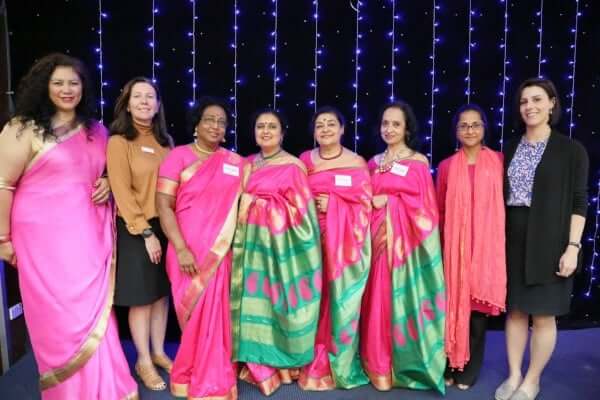They are a winning combination and they are determined to replicate their recent success with other equally empowering missions.
After dispelling the shame and stigma around breast cancer, Pink Sari Inc, Multicultural Health Communication Services (MHCS) and Cancer Institute NSW have once again teamed up, this time round to raise awareness of colorectal cancer, otherwise known as bowel cancer.
Their latest initiative ‘Your Bowel Matters’ will be tackling historically low screening rates among Indian and Sri Lankan communities with a view to reduce mortality.
The Parra Villa Function Centre was awash with pink for the program launch. It was a trip down memory lane as Pushpa Jagadish sang Pink Sari Melodies popular choice winner Naari.

Addressing representatives from the South Asian community, Pink Sari Inc President Shantha Viswanathan recalled how Pink Sari had become a movement thanks not just to the passion and dedication of its volunteers but also innovative collaborations and out of the box thinking.
“Our story is your story,” she proudly added, urging stakeholders to take ownership of their health through active participation in the bowel-screening program.
Since 2006, eligible Australians in the age group 50-74 receive a free kit through National Bowel Cancer Screening Program (NBCSP). Easy, quick and done in the privacy and comfort of one’s own home, the kit involves a faecal occult test and is rightly dubbed as a “gift for living”. The program has now been expanded, with everyone in the high-risk bracket set to receive the kit once every two years.

With one of the highest rates in the world, colorectal cancer is the second most deadly cancer in Australia, and affects men and women, young and old. The risk of developing bowel cancer rises sharply from the age of fifty, with 80 avoidable deaths each week. While there are few warning signs, rectal bleeding, change in bowel habits and unexplained tiredness could be symptoms to watch out for. Poor diet choices, obesity and history of Crohn’s or ulcerative colitis are also high risk factors.
Most bowel cancers start as benign, non-threatening growths or polyps on the wall or lining of the bowel. While polyps are usually harmless, adenomatous ones can become malignant and if left undetected, can develop into a cancerous tumour, which in advanced cases can metastasise beyond the bowel to other organs.
A panel of experts spoke about the dreaded disease, dispelling commonly held myths and misconceptions around causation, diagnosis and treatment options.
“Thankfully almost 90% of bowel cancer cases can be treated successfully if detected early. And more importantly, the pain and discomfort of the traumatic journey could be bypassed through better screening rates,” explained Dr Viraj Kariyawasam.
The gastroenterologist, who has a special interest in cancer screening with emphasis on prevention and early detection, added that while there is a 98% survival rate for stage I patients, the prognosis for stage IV sufferers is a bleak 13%.
Reiterating the key message that prevention is infinitely better than cure, radiation oncologist Dr Jay Jayamohan was dismayed by the apathy of the South Asian community as a whole, towards health planning and proactive lifestyle strategies.
“Our people are often in denial and do not want to talk about health. Our biggest setback is complete lack of preventative care,” he lamented, urging a shift in attitude.
Describing the statistics as frightening, Christopher Horn, who manages the NSW screening program, provided an overview of the cost effective and life-saving public health measure. “Every two years is the best practice and a couple of minutes now can save months of treatments. The uptake is particularly low among migrant communities, specifically Hindi and Tamil speaking ones, which is why we have strategically partnered with influential groups like Pink Sari in the hope of reaching 25,000 eligible CALD people,” he explained.
MHCS director Lisa Woodland spoke about collaboration and co-design to build capacity of cancer screening through record participation, hoping to make a difference both through individual and collective action.

Bowel matters are often the butt of many jokes. But bowel cancer survivor and now Pink Sari ambassador Karthikeyan Krishnan’s powerful narrative was certainly a wake-up call for everyone attending the launch. “A simple screening test could have saved me a lot of painful procedures,” he regretted in hindsight. Grateful for the exceptional healthcare system in Australia, he is now urging the community to take the screening program seriously. After all we have everything to lose, if we dont.
For information on National Bowel Cancer Screening Program, call 1800 118 or visit Pink Sari’s Facebook page.
"Your bowel matters," says Pink Sari with its incredible new initiative

Reading Time: 4 minutes



